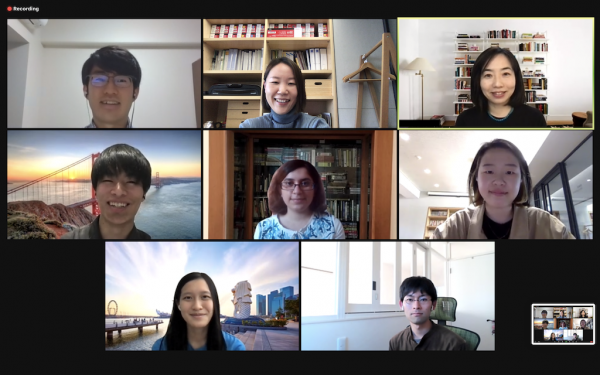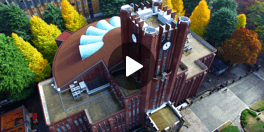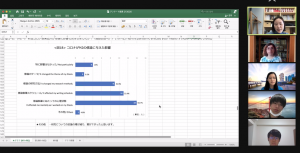
May 10, 2021
2020年度末オンライン座談会:M1&M2に聞く『コロナ禍の学府生活』2020 Academic year-end online roundtable: Life as a GSII master’s student during the COVID-19 Pandemic”
去る3月26日、2020年度末に行なった「M1&M2に聞く『コロナ禍の学府生活』」アンケート回答者の有志のご協力を得て、オンライン座談会(バイリンガル)を開催しました。多様な専門分野で学ぶ方々に、特異な1年を振り返っていただきました。パンデミックはまだしばらく続きそうですが、この日々の一人一人の経験が、新たな価値の創出につながることを願っております。参加者のみなさんに改めて御礼申し上げます。(ウェブサイト&ニュースレター編集部)
Some of those who participated in the survey titled “Life as a GSII master’s student during the COVID-19 pandemic” joined in an online roundtable on March 26, organized by the editorial team of the III/GSII website and newsletter. Here is the report on the bilingual roundtable, where participants from different courses reflected on the academic year 2020. We are still nowhere near the end of the pandemic, but we hope that our experiences during these extraordinary times will somehow lead to new innovations. (Website & Newsletter Editorial Team)
[English text will follow the Japanese text]
座談会参加メンバー (学年は2021年3月26日現在):
[M1]
平城裕隆さん:総合分析情報学コース。サイレントスピーチのインターフェイスについて研究。4月よりM2。
矢作優知さん:先端表現情報学コース。遠隔環境でモノづくりをしている人をサポートするためのツールの研究。4月よりM2。
カリーシャ・オングさん:ITASIAコース。研究テーマは、行政によるコミュニケーション理論の応用の可能性について。シンガポールで日本大使館による学生ビザの発行業務再開を待ちながら、オンラインで授業を受けている。この座談会にもシンガポールより参加。
[M2]
柳志旼(ユ・ジミン)さん:社会情報学コース。修論のタイトル:「テレビCMがつくるモバイル時代の『家族』――『ケータイ家族物語』、『白戸家』、『三太郎』を事例に」。4月より博士課程1年。
前川尚澄さん:文化・人間情報学コース。計量社会学を研究。修論のタイトル:「ジェンダーの視点を用いた日本人の米中韓三カ国及び国民に対する意識の規程要因の検討」。就職活動はすべてオンラインで経験。4月よりIT企業に就職。
サバー・マーチャントさん:ITASIAコース。研究テーマは日本のスポーツ漫画における「がんばる」の表象について。
司会:金佳榮(特任研究員)、神谷説子(特任助教)
つらかったのは「人との交流が減ったこと」- オンラインで忙しくなった人も
– 2020年度は、みなさんの多くがパンデミックとともに学府での院生生活を始めたり、あるいは就職活動をしつつ修論を書くなど、前代未聞の年でした。1年を振り返って、一番困ったこと、大変だったことは何ですか?
前川さん:人と会う頻度が劇的に減ってしまったのが、本当に大変でした。研究に関しては、M1の時は、例えば研究室やコモンズで、偶然来ていた友人や先輩や後輩に自分の研究の話をし、そこから自分が思ってもいなかったようなアイデアが出てきたり、こういう風に書くといいんじゃない?というように、相互にコミュニケーションし合うことによって、お互いの研究をブラッシュアップしていくことができていたのが、2年生になってそういう機会が劇的に減ってしまいました。修論を書き上げた今も、(そういう機会が2年目にもあれば)もうちょっと自分としてはやれたんじゃないかなと思っています。
研究以外では、大学の友人とも、実家の家族や地元の友人とも会えず・・・。(家族と)昨年初めて会えたのが11月で、そこまで会えないというのは自分の中で精神的に少し大変なところはありました。
柳さん:私も一番困ったのは、人との交流が本当にほぼゼロになっていたことです。すごく孤独でした。私も一人暮らしで、一年以上、一時帰国もできていない状態で、ずっと一人でステイホーム。大学の友達と会えないのはもちろんのこと、家族とも会えず、本当に人と会わない。一日一人でいるのがずっと続くのが心細いというか・・。この心理状態で修論書けるのかな、と夏までずっと悩んでいました。
マーチャントさん:私も人に会えなかったのがつらかったです。ITASIAコースは9月に始まりますが、パンデミックが起こったときはちょうど1年生の前半が終わったところでした。来日してしばらくは慣れるのに時間がかかり、前期が終わることにようやく少しずつ日本語にも大学の同級生とも慣れてきて、後期からの選択授業が始まれば、もっと仲間と打ち解けられるだろうと楽しみにしていました。しかし授業がオンラインになり、そうもいかなくなりました。研究自体は、もともと資料分析なので大した影響は受けていません。でも、人と交流できないことはかなり堪えました。
昨年の4、5月ごろはまだ外出や人と接することがどれぐらい安全なのかがわからず、結局6月末まで寮からほとんど出ませんでした。これは精神的にかなりつらくて、人生で初めて成績にも影響が出るほどでした。2年生になって少し状況は改善しました。オンラインとはいえ先生やゼミ仲間と少しでも会える機会を大切にし、前より外に出るようになり、キャンパスにも少し行くようになりました。だいぶ研究もできるようになってきましたし、日本語能力試験に向けても勉強し、挑戦した級を合格しました。
オングさん:ITASIAコースはさまざまな専門の人がメディアやコミュニケーションを研究できるということで、必ずしもその専門知識が最初から豊富であることは求められていません。ですから、私のようにメディアやコミュニケーションを学部で学んだわけではない者は、かなり本を読んで背景を勉強する必要があります。例えばアジアの歴史に関する授業では、歴史に関する本をたくさん読まないとしっかりしたレポートは書けません。でも私は(コロナで学生ビザが出ないので)シンガポールにいるため、図書館の本へアクセスできない。オンラインでいろいろ調べましたが、残念ながら東大のオンラインのリソースは完璧ではなく、結局自分のレポートを書くための背景を十分に理解する、ということができないままとなってしまいました。
ちゃんとしたレポートを書きたくても、資料が十分手に入らないのは本当に困りました。シンガポールの大学に通う友人を頼って本を借りてもらったりしましたが、こんな状況が多かったので、成績に影響が出ないかと本当に心配でした。
平城さん:研究以外のことを話す機会が非常になかった、と思っています。そもそも全体として会話自体が少なくて。学部の時は、研究以外の会話から研究の話につながることが多かったので、そういうことがなくなったことは、オンラインでは補えないところなのかなと思っています。
自分の研究に関していうと、実際にデバイスをつくったりして、研究室に行ったり機材を使って測定したりというのがあるので、行かないとどうしようもないなというところはあって、そういう意味では、オンラインの中では研究のテーマを考えたりするところも難しかったなと思います。
矢作さん:すごく忙しくなった感じがありました。どうせ大学に行けないから、Sセメスターのうちに2年分全部単位を揃えるといいと聞き、2年分を受けていたので、授業だらけで大変でした。授業や研究室、それから制作展も取ったのですが、どれも「コロナ対応のためにミーティングしたいのでちょっと集まってください」ということが大量に発生して、2個同時に(ミーティングが)バッティングすることがすごく多くて。移動時間がないんだから来れるでしょう、みたいなかんじで山ほど予定が入り、予定を忘れちゃうこともかなり多くて、大変でした。あとは、学内でオンライン授業を支援する「コモンサポーター」としても働いていたので、それも忙しかったです。
研究に関しては、僕も大学に行って、実験装置を使って実験する必要があったんですが、なぜか結構、健康管理フォームに引っかかって入構許可が出ないことがあって。一年中鼻水が出たりして、かつ平熱が高いのでフォームに引っかかりがちで、行きたくても行けないことが多かったです。
コロナ禍でのポジティブな出来事や気づき
– 一方で、コロナのおかげで新たな発見があったこと、ボジティブに捉えられたことがあれば教えてください。
平城さん:動画で授業が受けられることになったことです。授業をリアルタイムで聞かなくて良くなり、倍速で見れば4コマあっても実質2コマみたいな感じになって、そこでブーストすることができました。移動中にも聞けるので、電車の中で講義聞いてそのまま次の場所に行くことができて良かったです。研究室で次に作業があるけど、授業を家で聞いていると間に合わない状況をクリアするためには移動中に聞けばいい、と気づいてからは移動中に聞いてましたね。
柳さん:M1の時に駒場の授業を取っていましたが、駒場へは移動時間があるので、そのコマの前後は本郷の授業が入れられなかったり、駒場へ行って来ただけでも疲れる、みたいな感じだったんです。今回全部Zoomになって、開講される授業が駒場であるか本郷であるかは関係なくなり、そういえばSセメスターに駒場の授業を(移動のことなどを)気にせずに取ることができました。
オングさん:個人的なことになりますが、昨年1月にITASIAコースに合格した後に子供を授かったことがわかりました。授業がオンラインになったことで、シンガポールで出産し、家族のサポートを得ながら授業に出ることが可能になりました。9月に大学院に入学し、10月に出産しましたが、病院で赤ちゃんの様子をみながら授業を受け続けました。その後も画面オフできたので赤ちゃんの世話をしながら講義を受けることができました。もしコロナがなかったら大学院が始まる数ヶ月前に日本へ行き、出産後はしばらく授業を休み、育児をしながら授業を受けることになったかもしれません。
私にとって、コロナがもたらした幸いは、オンライン授業のおかげで対面だったらできなかったことをいろいろと可能にしてくれたことです。子供を身籠ることがありえる女性にとって、これは本当に重要です。夫も子供が生まれてから最初の数ヶ月をそばで過ごすことができました。そして両親のサポートのおかげで授業をSタームがんばって受けることができました。いろいろと困難を伴ったことは間違いありませんが、日本にいたらもっと大変だっただろうと思います。オンラインはスケジュール通りに大学院に入ることを可能にしてくれました。コロナがなかったら入学を先伸ばさざるを得なかったかもしれません。
矢作さん:大学に行けなくなったので、工作用の機械を思いきって自宅に揃えて、3Dプリンターも自宅に導入したので、家で工作ができるようになりました。コロナがなかったら、研究室にいっぱい置いてあるので、それを使っていたと思うんですけど。3Dプリンタを使った研究もしているので、締め切りが近くなってくると動きっぱなしになっているような感じです。印刷が1回24時間かかるので、(大学のプリンタは印刷を)スタートして家に帰っちゃうのであまり印刷の様子を詳しく観察することがなかったですが、特殊な印刷方法を開発するような研究をしていたので、家にいると夜中の23時にも、今どうなってるかなと様子をこまめに見たりできるようになり、細かい印刷の失敗の仕方とかを観察するのには良かったですね。
マーチャントさん:パンデミックが自分にとってポジティブな影響を及ぼしたとすれば、間違いなく以前よりも人と交流することの大切さを実感していることに尽きます。昨年末に数ヶ月帰国していたのですが、いつもなら自室にこもる私がそうしなかったので、両親が「サバー、どうしたの?ずいぶん私たちと一緒にいるようになったね!部屋にこもらなくなった!」と驚いていました。海外で人と接することがほとんどなく過ごしていたのですから、それは当然です。以前よりもずっと周りの人の存在をありがたく思っていますし、家族と接する機会を大切にしています。
そして、授業や就職活動がオンライン化したことのよさは、やはりネットに接続できる環境さえあればどこからでもアクセスできることですよね。1、2月に開催されたオンライン企業説明会には帰国中のインドの自分の部屋から参加しました。時差はあれどちゃんと参加できて、質問もしました。たしかに対面開催の合同企業説明会であれば、いろんなブースを自分のペースで訪問できますが、オンラインでは時間の制約があり、限られた企業としか話すことができません。それでもオンラインだとやはり便利だと思います。
会議やシンポジウムもそうです。インドの出身大学で行われたゲスト講義がすべてオンラインとなり、日本から参加し学びを得ることができました。聴講者だけでなく、スピーカーになる方も、世界中どこからでも参加できますよね。このようなイベントはオンラインになったことで、本当に多くの人が参加しやすくなったと思います。
前川さん:みなさんのご意見と共通しているところも多いですけど、やはりいろんなところと地理的な障壁がなくなったのが、すごくありがたかったと思います。例えば就職活動の時、今までは基本的に受ける会社にまで行って面接を受けるという形態が多かったですが、コロナ禍になってからは、自宅のパソコンでZoomを使ってオンライン面接になったので、移動時間が減り、一日に複数の会社を受けるのも負担が減りました。就活をする上では慣れないことの方がものすごく多かったですが、オンラインになって逆にそこはポジティブに捉えられるかなと思います。
研究に関係するところでは、学部のときから、例えば、すごく行きたいシンポジウムが大阪であるけど、この2時間のために東京から大阪までを往復すべきなのかな、というようなことをすごく悩みながら、行くか行かないかを決めていました。今は基本的にZoomでやっていただけることが多くなったので、このシンポジウム見てみたいなと思ったら、もう普通にそのままZoomでポンと入って、しかも移動中でも見られる。家にいなくても、また現地にいなくてもそういったものに参加できるようになったのは、非常にありがたかったなと思います。
もちろん、例えば実験みたいに、対面でなければ絶対無理だろうというものもあると思いますけど、今まで対面が絶対視されてきたものが、オンラインでもいけるんじゃないかという風に、いろんな方面で地理的な障壁がなくなっていき、基本的にみんな違う場所から同じことに参加することが前提になっていろんなものが進んでいるのは、非常に大きな出来事だったんじゃないかなと感じています。
– 就活のことについてもう少し伺います。説明会や面接が全部オンラインになって良かった面もあるとのことですが、逆に難しかったことはどんなことですか?
前川さん:私が一番感じていたのは、こういった風にみなさんと話をしている時って、このZoomに映っている人の目を見て喋ればいいのか、それともパソコンのカメラを見て喋ればいいのか、どっちか分からないということです。私はどちらかというと画面に映る人の目を見て話すようにしていたんですけど、それだとふっとちょっと見ると、やっぱりカメラで映しているので、相手からすると目線を外して見ているような感じになってしまう。やっぱり目線を合わせて喋らないと失礼になってしまうのではないかな、それが原因で落ちたら、面接うまくいかなかったらどうしよう、と思っていました。
もうひとつは、喋っていて、あ、相手も結構好意的に感じてくれているな、みたいなことは、対面であれば肌の感覚だったり雰囲気で感じたりできることもあったと思うんですけど、それがオンラインになると一切わからない。相手の顔を見ることしか判断材料がないので、いま自分が喋っていても相手がどう感じているかをうまく判断できない、判断しにくいと思っていました。まあ内定はいただけたので良かったですけど、そこが就活全体を通じて答えを見つけられないまま終わってしまったなという感覚はあります。これを後輩にこういう風にしたらいいよというのも、言語化してどうやって伝えればいいんだというのもなかなか分からず、そこは今後の課題でもあるのかなという気はしていますね。
今後学府に期待すること – 学生向けの情報共有のあり方と、図書館資料へのよりよいアクセス
– 2020年度はなにかと急いでバタバタと対応せざるをえなかったことが多かったですが、この4月以降はもう少し学環・学府に学生のために改善してほしい、というようなことがあれば教えてください。
柳さん:コロナ前はコモンズで集まって他の人と情報共有ができていましたが、オンラインになってからは情報共有も活発にならなくなり、(一時期は)学務も長く窓口が閉まっていましたし、何か問い合わせたい時に誰にすればいいのかがよく分からず、困りました。また、ある情報は学環・学府のウェブサイト、ある情報はポータルサイト、というように情報の開示もばらばらで。結構情報を調べるのが大変だと思っていたので、もう少し(情報共有の)システムを構築していただければいいなと思います。
(2020年度の初めに立ち上がった学府の)Slackは役立ちましたが、その存在を知らない友達が結構いました。私は最初に先端表現コースの友達からSlackができたと聞きましたが、おそらくSlack自体が先端を中心に最初に立ち上げられて、そこからみんなどんどん入ってくるみたいな感じだったので、社情とか文人とか、いわゆる文系の人はSlackの存在自体を知らなかったのかなと。まだ入ってない友達もいるんです。Slackの存在もあまり共有できていなかったなという感じはあります。
前川さん:私も、ポータルと自分の大学のメールアドレスとSlackと、その3つに均等に情報が行き渡っているわけではなくて、Slackでしか出てこない情報と、ポータルでしか出てこない情報と、メールでしか出てこない情報の3つがあって、自分はどれを見ればいいんだ?とすごく悩みました。Slackができる前はポータルを見たんですけれど、その時もメールで通知が来る時とメールで通知が来ない時がありました。どういうお知らせが重要で、どういうお知らせがメーリスで送られてくるのか、というのがあまり分からず…。
私もSlackの存在を(ある時点まで)知らなかったので、もしSlackの存在を知らない人、あるいは使えない人がいる場合のためにも、ポータルあるいは大学のメーリスなどで、均等に情報が伝えられるような仕組みを作っていただきたいなと思います。便利なシステムを導入するのはいいですけれど、システムが複数あることで、その間になぜかデジタルディバイドが発生しているという、なんかよく分からない状況になっていた気がします。ちょっと言い方悪くて申し訳ないですけど、それで結構自分たちも迷ったり振り回された部分がちょっとあったのは否めないので。後輩たちにはそういうのはあまりしてほしくないなと思うので、そのあたりをできるなら改善していただきたいなと思っています。
柳さん:学環の図書館が完全予約制で書庫の中に入ることも1営業日前、前半は3営業日前に予約入れる必要があって、この本見たいなと思った時にぱっと取れないのが困りました。本は、計画してこの本を読もうというのももちろんありますけれど、修論書いてる最中に、いまこの本ほしいと思った時に、3営業日も待たないといけないのは利用しづらい。私はM1の時までは学環の図書館を結構利用していましたけれど、M2になってからはずっと総合図書館の方を使っていました。学環図書館を予約制じゃなくて、書庫に入るのは当日でもOKになったらいいなと思います。
前川さん:私はデータ分析が主だったので、ガッツリ資料研究する人よりは図書館使う頻度は少なくて済んだんですけど、やっぱり図書館は非常に重要なので、予約制を、自分の中では見直してほしいというのはあります。友人の中でも実際、図書館の資料を見たいけど見れなくて、わざわざ国会図書館まで行ったけどその国会図書館も予約制みたいな感じで、研究が進まなくてどうしようと、終盤11月、12月ぐらいになってすごく焦ってる人がいました。修論の締め切りという大きな区切りはもちろんあるんですけど、研究をするという面でも不都合があると思うので、今後の状況次第ではあると思いますが、ちょっと見直していただきたいなという風に考えています。
– みなさんのご意見はこの座談会のレポートでお伝えし、教職員の方々にも参考にしていただけるようにしたいと思います。
今日はいろんなお話を伺うことができました。ご参加くださりありがとうございました。
企画:ウェブサイト&ニュースレター編集部
構成:金佳榮(特任研究員)
構成・和/英訳:神谷説子(特任助教)
英語校正:デービッド・ビュースト(特別専門員)
[ENGLISH VERSION]
Roundable participants (Status as of March 26, 2021):
[M1]
Mr. Hirotaka Hiraki: Applied computer science course. His interest is in human-computer interaction, focusing on silent speech interfaces. 2nd year master’s student from April.
Mr. Yuchi Yahagi: Emerging design and informatics course. His interest is developing tools for creators working in remote settings. 2nd year master’s student from April.
Ms. Charisia Ong: ITASIA program. Her interest is communication theory and its implications for government outreach to the public. She has been attending classes from Singapore as she is still waiting for the Japanese government to restart issuing visas.
[M2]
Ms. Jimmine Yoo: Socio-information and communication studies course. Her research interest is TV commercials. Doctoral student from April.
Mr. Naoto Maegawa: Cultural and human information studies course. Studied in the field of sociometry. Joined an IT firm in April.
Ms. Sabah Merchant: ITASIA program. Her master’s thesis theme is on the representation and value of the idea of “gambaru” in contemporary sports manga.
Moderators:
Kayoung Kim (Project researcher), Setsuko Kamiya (Project assistant professor)
Lack of in-person communication has been the hardest
– The academic year 2020 began almost simultaneously with the pandemic for most of you, and you had to adjust to the situation while attending classes, job searching and writing your theses. What has been the most difficult thing to deal with?
MAEGAWA: The hardest thing for me has been the absence of meeting people in person. In my first year, there were many opportunities to speak about research with my friends and colleagues at the lab or the Commons, and that actually helped polish our research. But such opportunities diminished in my 2nd year. Even though I was able to complete my thesis, I feel that I could have done better (if those opportunities had existed in my 2nd year). The fact that I couldn’t meet my family and old friends for a long time was also mentally challenging.
YOO: The lack of socializing with people has been difficult for me as well. I haven’t been able to see my friends, nor have I been able to visit my family in Korea for over a year. I stayed home alone and felt so isolated. It was quite difficult, and I wasn’t sure until summer if I would be really able to write up my master’s thesis.
MERCHANT: I think the biggest thing was not being able to socialize with other people. ITASIA Program starts in September, and the pandemic just hit after my first semester. When you are an exchange student, you’re not that fluent with the language and so it takes a while to settle in. The end of the first semester was when I finally picked up some proficiency in Japanese, and I was starting to get to know my classmates. We were just about to start our elective class, where I could interact more with my classmates. But because all the classes shifted online, there was little chance to interact with my class. My research actually didn’t get affected that much because it is entirely text based, and most of it was going to be conducted online.
There was a lot of confusion, especially in April to May last year, regarding how safe it is to go out or interact with people. I ended up not leaving my dormitory very much until the end of June. That significantly affected my mental health, and for the first time my life it affected my academic performance. I was able to start picking things up as the second year began. Even though I wasn’t able to interact as much, I still took the chance of my monthly seminars and interacted with my advisors and fellow students. I also started going out a little more and started coming back to campus. So far, the A semesters of the 2nd year were better than the S semesters of my first year. I was able to rally back in terms of academics and my research. I was able to clear a level of my Japanese proficiency test.
ONG: The ITASIA program allows people from different fields to come to learn media and communications, and it doesn’t require you to have a lot of background. As someone who doesn’t have background in history, the media, communication and all these theories… I needed to read. For example, we had to learn a module in the history of Asia. If you don’t have a background in history, you have to read extensively to write a term paper relatively well. But because I’m in Singapore and don’t have any physical access to the library books, I had to do my research online. Unfortunately, the online resources of Univ. of Tokyo are not very comprehensive, and so when writing my term papers, I had difficulty in trying to understand the background. For example, I had to write a paper on the history of the partition of India. I was interested in it because of the lectures, but all the readings I needed to do to really understand the different perspective of history, they were not available online on the catalog. That was the same for other questions for the term paper.
Not having access to physical resources at the library really affected me, especially in my first year. I was afraid that this situation would affect my grades. Without having access to physical resources, how can you show that you have done enough research? I had to rely on my contacts who are studying in universities in Singapore to see if they can help me access physical libraries.
HIRAKI: I also feel that I didn’t have much opportunity to talk to people. During my undergraduate years, there were many occasions where conversations with others would lead to an idea for research. I guess online doesn’t seem to allow that sort of thing to happen. In terms of my research, my field involves creating devices and testing them with equipment, so I can’t really do anything if I don’t go to the lab. Working remotely made it difficult to come up with a good research topic.
YAHAGI: I became really busy. One of the reasons was because I decided to take all my necessary credits during the S semesters, so it became classes after classes. And then, I had tons of online meetings for my classes, labs and other things. There were many occasions where two meetings were planned for the same time period. I was so busy to the extent that I would even forget my schedule. I also worked as a “common supporter” for the university and helped people attend online classes smoothly, so that role made me busy as well.
Regarding my research, I also had to go to the lab, but because my temperature is usually a bit high and I tend to have a runny nose all the time, I sometimes got rejected by the heath check form and couldn’t enter campus even if I wanted to.
The benefits of going online during the pandemic
– Meanwhile, were there anything positive that you found in this situation?
HIRAKI: I’m glad to be able to take some classes via recordings. This allowed me to not only listen to class real time, but I also got to watch them in double speed, and that helped me save time. It also allowed me to listen to the recording while on the move.
YOO: In my first year, I took a few classes at Komaba Campus, but because of the physical distance of the campuses, I couldn’t take other classes at Hongo Campus right after those classes. I also felt tired after going to Komaba. But this year, because all classes were on Zoom, it didn’t matter where the classes were held. I didn’t hesitate taking a class from Komaba during the S semesters.
ONG: My experience is more personal. After I found out that I was admitted to the ITASIA program in January, I also found out that I was expecting. Having the option to attend classes online meant I could give birth in Singapore and be with a support system while attending classes. My semester started in September, and I gave birth in October and I could still attend classes. I could attend lessons from the hospital while taking care of my baby. To be able to turn off my video meant that I could take care of my baby while I was listening to lectures. The alternative reality without Covid would be that I would have had to go to Japan a few months earlier to prepare to give birth, and I would probably had to miss a few classes after giving birth and then, and I would probably have had to struggle to take care of my child while attending classes without support.
One good thing about Covid, at least for me, is that it enables us to do more things than if we had to do things face to face. Especially for females, because we have the child bearing responsibilities. I personally experienced this. Because of online learning, my husband was able to experience the growth of our baby in the first six months, as opposed to being apart. And I had strong family support from my parents in Singapore so I was able to go through my S1/S2 semester. It was difficult, but it would probably have been even more difficult if I was in Japan. It allowed me to start my studies on time. Without Covid I might have had to delay starting the ITASIA program.
YAHAGI: Because I couldn’t come to campus for some time, I decided to buy engineering equipment that are necessary for my research, especially a 3D printer. Without the pandemic I’m sure I would have used one of the many in our lab. It takes about 24 hours to print one item with 3D computers, so it used to be that I would push the start button and leave the lab, so I wasn’t able to observe the printing process. But now I get to observe how it’s going when I want to, even late at night, so it’s great that I got to see how minor printing errors are processed.
MERCHANT: One thing that this pandemic has affected my world view for the better, is my view of human relationships and connections. I value them a lot more now. I went back to India at the end of last year for a couple of months. I have a tendency to stay in my room whenever I go home, but this time, my parents said, “Sabah, you are spending more time with us now. You’re not staying in your room all the time!” That’s because I spent so much time abroad without having people to interact. I value the people in my life more and the chances that I can interact with my family.
One of the advantages of online seminars and job searches is that you can access from anywhere as long as you have internet access. I am also job searching, and in January and February, I attended a couple of job fairs held online from my own room in India. The only issue was time zone, but that isn’t anyone’s control. I could still participate and ask questions. With physical job fairs with a large number of companies, you can go to different booths and talk to them at your own pace. With online job fairs there is a limited time to attend individual sessions and Q&A sessions, and you can only speak to a few companies. But other than that, shifting a lot of things to online makes it very convenient.
It’s not just job fairs but conferences and speaker sessions. My undergraduate university organized a few guest lectures and seminars online for everyone, but normally, those were held in person. Because they shifted to online, I was able to attend from Japan and receive learning. Making events online makes it a lot easier. You can have a lot more people as audience and as speakers themselves. They don’t have to travel and can join in from wherever they are in the world. A lot of these activities, talks, and events are now more accessible to a lot more people.
MAEGAWA: I really appreciate that online has brought down geographical barriors. For example, during my job search, it used to be that I would visit the office of a company that I’m applying to and participate in an interview. But because of the pandemic I can attend an online interview from my computer in my house, so it spared the time to travel, and it made it much easier to make appointments with multiple companies. Online interviews were full of challenges, but I regard this part of the situation as very positive.
On the research front, I’m grateful that it’s become so much easier to attend symposiums. Previously, I had to think hard if it was really worth paying the cost of going back and forth between Tokyo and Osaka just to attend a 2-hour symposium. But now, since many such events are held on Zoom, I can just participate with just a click. And I can even watch the event while I’m on the move. It’s become really convenient. Of course, there are things like experiments using equipment at the lab that just can’t be conducted online. But the fact that things are now being planned with the premise that people are taking part from different places is a major development.
– You mentioned the positive side of online job search. What was the challenging side of it?
MAEGAWA: One thing that really bothered me was where I should be looking when I’m speaking. Am I supposed to look at the eyes of the person speaking on the Zoom screen, or should I look into the camera while I speak (so it’ll look as if I’m directly looking at them)? I think I was looking at the eyes of the person on the screen, but then, I knew that from the interviewee, it would look as if I wasn’t looking at him or her. I kept wondering if it would give a bad impression if I didn’t look like I was looking them in the eye. I was actually nervous that I would fail the interview because of this.
Another thing is that, with in-person interviews, you can kind of sense that you are giving a good impression to the interviewer from the atmosphere, but you don’t have that with online interviews. The only clue is that person’s face on the screen, but it’s really difficult to know how they are feeling about my comments. I’m really happy that I got a job offer in the end, but I was never able to understand how to deal with all these issues, and I still have difficulty finding the right words to explain it to my juniors.
Seeking improvements for information sharing and better access to library resources
– Everything had to be adjusted to the situation in haste during the academic year 2020. As we enter the new academic year, what changes would you like to see from the III/GSII for the students?
YOO: We used to be able to exchange information at the Commons, but since we’ve shifted to online, it’s become really difficult to get information. It wasn’t clear who I should seek information from, especially when the physical office of the student affairs division was closed for some time. I also became confused because there were times when some information was carried by the portal site while other information was on the official website, and I kept having to go back and forth. I’m hoping that this system will be reviewed.
Slack was helpful, but several people around me didn’t know that we had started using it. I first heard from a friend in the Emerging design and information studies course, but while people in that course seemed to know more about its existence, more people in the Social-information and communication studies course and Cultural and human information studies course weren’t aware of it, or still haven’t joined it.
MAEGAWA: I also felt the same way about the inconsistent information flow from the portal site, e-mails and Slack. Some info came only from Slack, only the portal site and only via e-mails, and I wasn’t sure which media I should be following. Of course, you should check all three, but it’s not always possible to do that. I also didn’t realize that we had a Slack channel for GSII until a certain point. If we’re going to use different media, information should be shared equally among them to some level, in case some students don’t have access to one of the media. It’s good to introduce a convenient system, but there was a difference of information among them. I hope the situation will improve so students don’t have to experience the confusion that we dealt with.
YOO: Another thing is that I hope that the reservation system for the library will be eased. I was frustrated that we had to wait one day – it used to be three days in the first half of the year – before we could access the books. Of course, there are books that you schedule to read, but there were times while writing my thesis that I just had to access a certain book now but had to wait for three operating days. I used to use the III Library pretty regularly but during my second year I resorted to the Main Library. I hope that the III/GSII Library will stop being reservation only and we’ll be able to enter the stacks without prior reservation.
MAEGAWA: Because my research was data analysis, I didn’t have to use the library as much as those who worked on text analysis. But still, the library is very important and I also hope that the reservation system will be eased. One of my friends, because he couldn’t access the books right away, decided to visit the National Diet Library only to find that he needed to make reservations there as well, and this was around November and December. I realize that it depends on the state of the pandemic, but I do hope that there will be some changes in the rule, because it’s affecting research activities.
– Thank you for your valuable comments. We’ll share them in the report of today’s roundtable so that the professors and staff at GSII will be able to refer to them.
Thank you so much for participating today.
Organized by the Website & Newsletter editorial team
Text: Kayoung Kim (Project researcher)
Text & Translation: Setsuko Kamiya (Project assistant professor)
English proofreading: David Buist (Senior project specialist)


